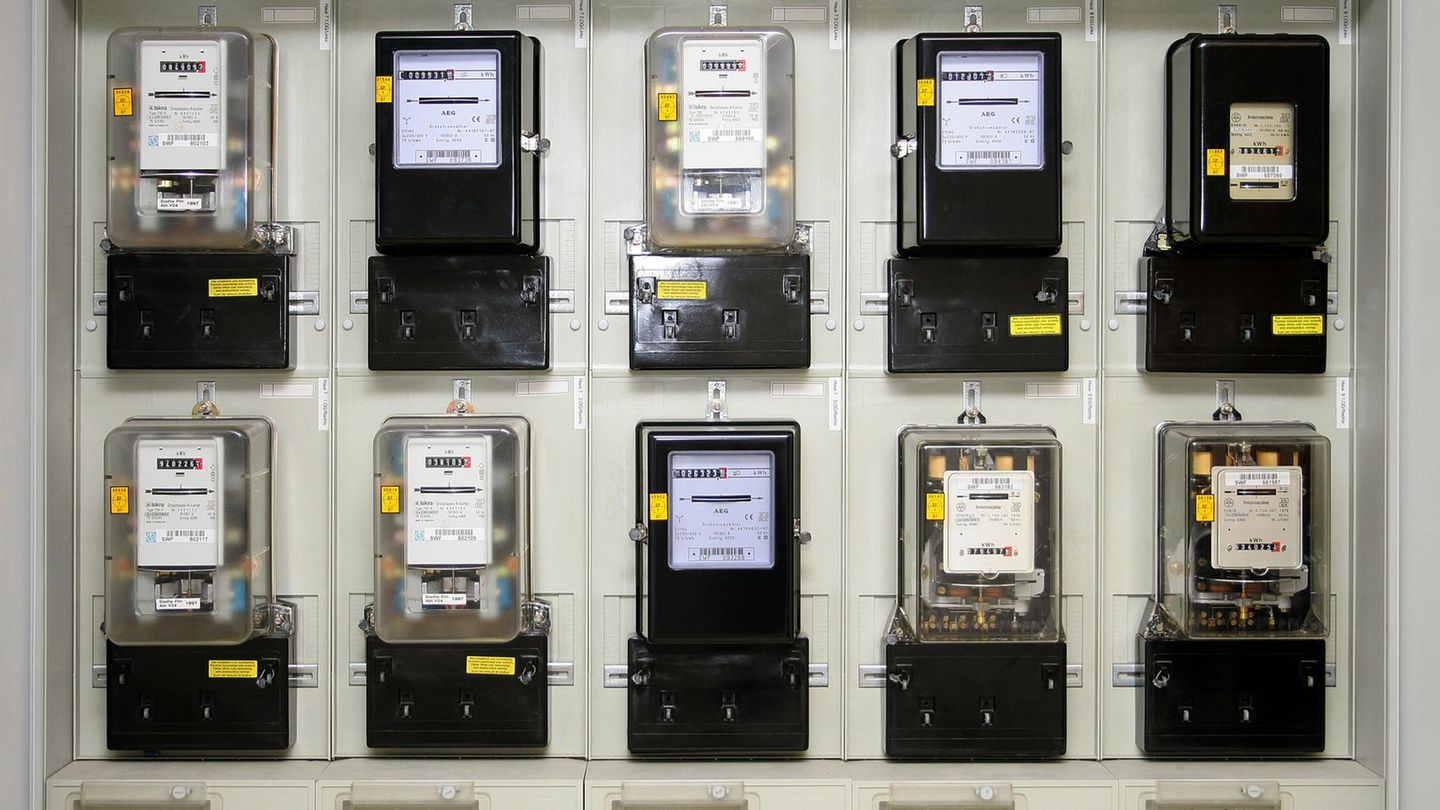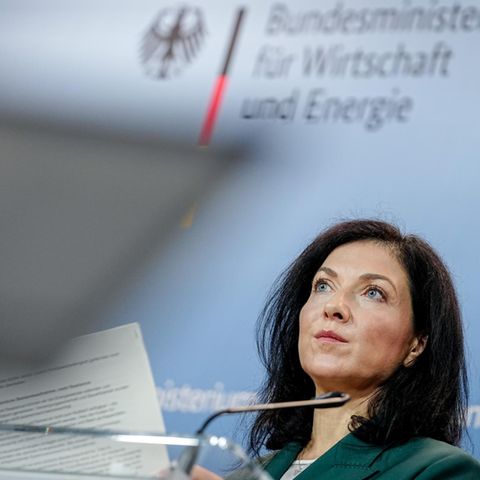Smart meter
“Consumers could save 70 percent electricity costs”
Copy the current link
Add to the memorial list
The Tibber company sells electricity at dynamic prices – with the help of so -called smart meters. In the interview, your Germany boss criticizes the government’s energy strategy.
Mr. Lauenburg, we Germans buy food or gasoline when it is cheap. Why does that work with Electricity not?
There is a lack of awareness that electricity prices change as well as gasoline prices. We Germans are used to an artificially fixed electricity price. However, the technical infrastructure in Germany is also missing in order to move many people to consume electricity intelligently.
Tibber has been offering dynamic electricity tariffs for years. This means, for example: whoever washes at night, if the electricity prices tumble due to a lack of demand on the stock exchange, benefits from cheap electricity. But it is not right.
One of the most important prerequisites for this are intelligent electricity meters, so -called smart meters. They provide data about when we use how much electricity and enable us to save money through the intelligent postponement of our consumption. Germany is in the bottom of Europe in the market launch of this technology. While 100 percent of households already have a smart meter in many European countries, it is not even three percent with us.
Why is that?
Above all, we stand in the way: too much bureaucracy, complex processes when applying for the application, installation and commissioning of smart meters. The technology we install is too expensive and complicated. There are almost 900 companies that operate measuring points – which are therefore responsible for the spread of the smart counters; To date, 300 of them have not installed a single intelligent measuring system. Even five percent of their customers have equipped it in the compulsory rollout, although it should be 20 percent by the end of the year.
To person
Merlin Lauenburg, 35, became the German managing director of Tibber in October 2023, a digital green electricity provider from Norway, which deals with dynamic electricity prices. Previously, the financial expert worked in the Viessmann Group
There are also the large energy companies that live well from static Electricity priceson the brake?
Traditional energy companies have been earning money for 100 years to sell electricity to the fixed price per kilowatt hour. It cannot be pointed out that dynamic electricity tariffs and thus the installation of smart points run counter to this business model. Nevertheless, the bureaucratic hurdles are the biggest challenge.
When a consumer calls from his network or measuring point operator and says: “I want a smart meter”, what happens as a rule?
Most customers don’t even know where to get in touch if they want a smart meter. If so, each measuring point operator has their own rules, their own online forms, different prices. Many measuring point operators also try to block the relevant inquiries because they are simply unable to install smart meters. We try to educate our customers as much as possible about the smart meter order and support them with an automated order process.
However, there is a legal obligation to incorporate smart meters. Who can claim this?
Households that operate controllable consumption facilities such as home stores, electric cars, wall boxes and heat pumps with over 4.2 kilowatts of power are entitled to an intelligent measuring system. There are also households with PV systems from seven kilowatts of peak and with an annual current consumption of more than 6000 kilowatt hours. With all of these, the smart meter must be installed within four months of request. Everyone else who inquiries must expect significantly higher costs. Some providers only asked for over 900 euros for the installation until recently!
You have against such prices complaint with the Federal Network Agency inserted. Has something came out of it?
We also legally against individual network operators. Some then removed the corresponding price sheets – but only to replace the high installation costs for an increased annual operating fee. Corrected over the oak duration of eight years, you can get out of the same.
So the network operators have the license ripped off?
It is more of a license to scare off. The installation of smart meters is only economical from a large number. Most measuring position operators have no increased interest in it.
Minister of Economic Katherina Reiche Now everything wants to make everything more flexible and cheaper. What do you think of your new ten-point plan to convert the energy transition?
We welcome your clear commitment to digitization and flexibility of the energy transition. But their conclusions are partly the wrong ones. We call for a smart meter offensive instead of a gas power plant.
What would you have wanted specifically?
We have added enormous amounts of renewable energies in Germany. However, we will run into a problem if we don’t manage to use these renewable energies efficiently, so exactly when they are generated. That is why the costs for intelligent measuring systems have to be down and the ordering process has to be simplified significantly. And if we reduce these costs, if more people can use more people, we also save network expansion costs and the electricity is becoming cheaper for everyone.
Often wind turbines have to stand still when there is too much electricity in the market and the power grids threaten to become unstable.
Yes, and that hurts. We lose approximately the annual current consumption of Hamburg by this switching off of green electricity. In the first half of 2025, 54 percent of our electricity consumption came from renewable sources in Germany. Alone if all households that already have e-cars, heat pumps or home stores have already had a smart meter today, we could increase this value without further additions from renewable to 67 percent.
Critics would say: the Lauenburg has talked well. He finally wants to sell electricity according to its kind.
Sure, we need new gas power plants to secure a certain basic load. However, significantly less than Ms. suggests – if we rely on the relatively cheaper flexibility and better integration of renewable energies. People puzzling how Katherina Reiche wants to reduce the costs of the energy transition with new gas power plants. On the contrary, it gets really expensive for consumers. The production of a kilowatt hour of renewable electricity costs five to twelve cents, which is from a gas power plant at 20 to 30 cents.
The Minister of Economic Affairs is taking the pressure out of electricity. She says we will consume much less than forecast in 2030 because fewer electric cars, heat pumps or companies go to the power grid than expected. Is this forecast plausible?
It is problematic if it calculates less electricity with around 100 terawatt hours than the Federal Network Agency does. Such statements have a self -fulfilling effect on the electrification of mobility and warmth. Because this will also be based on our ambition level when expanding the necessary infrastructure. A slower rollout of smart meters and network expansion will have real effects on our electricity prices because cheap renewable energy cannot be used efficiently. This could unsettle the Germans and cause them to hesitate even more to cope with electric cars or heat pumps that we urgently need to achieve our climate goals at all.
Reich also wants to delete the subsidies for privately used photovoltaic systems, which many should prevent a purchase. She would have to cheer: If people don’t get themselves from the roof themselves, they have to buy electricity from Tibber and Co.
People with a PV system are among our most important customers. You can complement the production of solar power with a dynamic electricity tariff. But basically we agree: there must be no unpleasant subsidization of PV stream in perspective. However, the grants must be carefully and gradually broken down. We experienced it at the electric car when the sales figures broke out rapidly after the sudden cancellation of the environmental bonus.
How important are electric cars for your business?
Very important. Also for the entire system. The batteries of 350,000 electric cars can replace a gas power plant because the electricity can be brought in flexibly in the market. In the future, the electric car will also be used as a moving battery for the household to bridge times when there is too little electricity available in the power grid. For all of this, however, we quickly need a smart meter in the households.
Specifically: What can you save if you have a flexible electricity tariff with a smart meter?
We hold back with forecasts, because the savings clearly depend on which consumption devices you have at home, whether with or without a PV system and so on. However, there are independent analyzes: Stiftung Warentest says that an average household with heat pump and electric car can save 300 euros a year. Other studies show that with the time-variable network charges that have been available in Germany since April 2025, e-car users can even save up to 70 percent compared to a fixed electricity tariff. And cheaper than diesel or petrol are electricity for consumption anyway.
Tibber originally comes from Norway and Sweden, where almost all households have smart meters. Where the residents load their many electric cars when the electricity is cheap. Where most houses are heated with heat pumps. What do these countries do better than Germany?
Tibber is the second largest electricity provider in Norway and among the top five in Sweden. The countries are ten years ahead of the German market in the area of the energy transition. In Norway, over 90 percent of people use an hourly dynamic electricity tariff. Since this year only e-cars have been approved there. We have a similar situation in Sweden, where 100 percent of households have an intelligent measuring system. The state has chosen a significantly more pragmatic approach here. He told the Swedish network operators in early 2000: by 2009, you had to be able to give customers the real monthly electricity costs and not any discount estimates. It was up to the operators themselves whether they will send someone by every hour to read an hour or voluntarily install a contemporary meter technology. At the end of the 2000, every Swedish household had a smart meter.
What does Minister of Economy Reiche have to do quickly to catch up with Scandinavia?
It must ensure that measuring point operators who do not comply with the market expansion of smart meters are sanctioned. In addition, all processes in this expansion must be quickly standardized. After all, we need a “smart meter light”, that is, affordable meters that we can install masses. If all of this is done, the dynamic electricity consumption has a very positive effect on our entire economy.
Source: Stern





